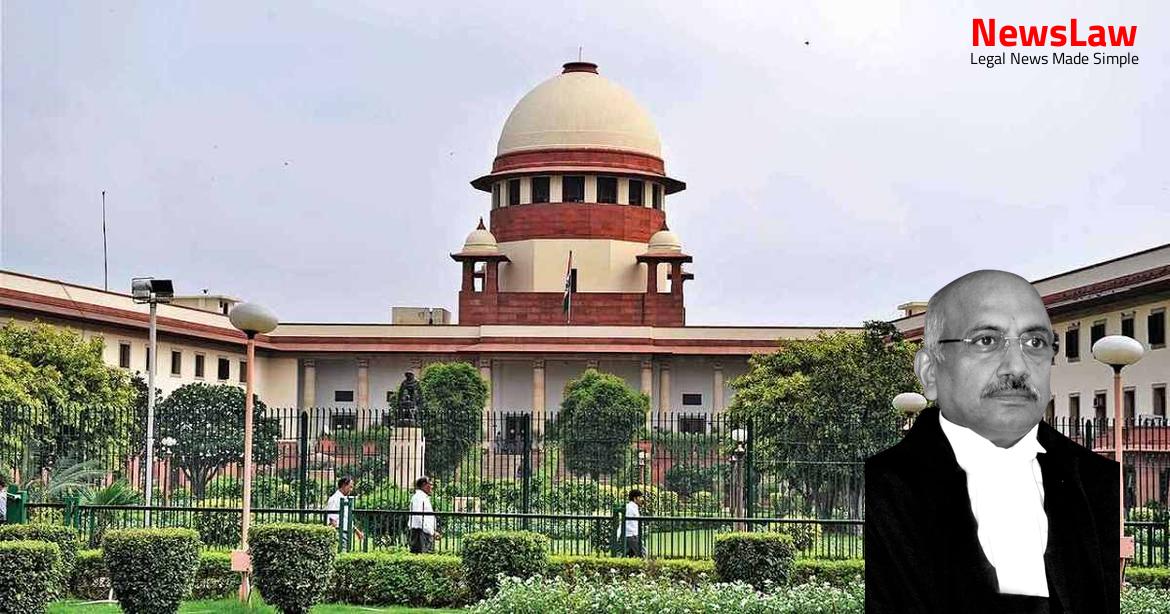Explore the intricate legal analysis conducted by the court regarding the jurisdiction of civil courts and Rent Tribunals in eviction cases post the implementation of Rent Acts. Dive into the implications of prior judgments on the validity and execution of eviction decrees, shedding light on the nuances of landlord-tenant disputes and the role of Rent Acts in governing such legal proceedings.
Facts
- Appellant’s father was the tenant of Shop No 4 at Jain 1 Katla, Bikaner Road, Suratgarh since 1982.
- The suit for possession of the premises was filed on 18.4.2013 after serving a notice of termination of tenancy under Section 106 of the Transfer of Property Act, 1882.
- The premises in question was not in the urban area when the suit for possession was filed.
- The State Government issued a notification on 11.7.2014 extending the provisions of the Rajasthan Rent Control Act, 2001 w.e.f. 5.2015.
- The Civil Court passed the decree for possession against the appellants on 28.5.2015 despite the Act becoming applicable to the area in question w.e.f. 5.2015.
Also Read: Landmark Judgment on Compensation for Fatal Accident
Issue
- The issue at hand is whether the civil court has jurisdiction to entertain the suit
- Alternatively, the question arises as to whether the competent authority under the Bombay Tenancy and Agricultural Lands Act, 1948 would have jurisdiction over the matter
Also Read: Land Acquisition Compensation Analysis
Arguments
- Mr. Gopal Sankaranarayanan, senior counsel for the petitioners, argued on the legal issue of whether a decree issued by a civil court after the Act was made applicable can be enforced.
Also Read: Judicial Review of Search and Seizure Authorization
Analysis
- Section 13 of the Punjab Rent Act states that a tenant cannot be evicted in execution of a decree passed before or after the Act’s commencement unless in accordance with the provisions of the Act.
- If a suit for possession is filed within the exemption period of ten years, the decree can be executed.
- The Punjab Rent Act prohibits the execution of a decree for eviction passed before or after the Act’s commencement.
- The Haryana Rent Act allows eviction only in accordance with its provisions.
- The Rent Act may not apply to buildings constructed before its applicability, even if they were built prior to the Act’s implementation in the area.
- The court considered various judgments involving Rent Acts of different states and their implications on eviction decrees.
- There was a specific reference to cases where the Rent Act’s applicability impacted the passing and execution of eviction decrees.
- The court also discussed the relevance of prior judgments in similar cases.
- The court clarified that the stay granted by the court does not nullify the High Court’s decree regarding the validity of a civil court’s decision.
- The Act in question does not affect the validity of a decree passed by a civil court but only limits the jurisdiction of the civil court once the Act becomes applicable.
- Decrees passed by the civil court can be valid and executable even after the Act comes into force, as long as the suit was filed within the exemption period.
- The Act restricts disputes between landlords and tenants to be raised only before the Rent Tribunal after its applicability to the area in question.
- Civil suits filed before the Act applies to an area must be decided by the civil court, not the Rent Tribunal.
- The rights of parties are determined as on the date when the legal proceedings are initiated.
- The Act does not contain any provision barring the execution of decrees passed by civil courts prior to its applicability to a specific area.
- The jurisdiction of the Rent Tribunal is upheld over the civil court for landlord-tenant disputes once the Act becomes applicable to an area.
- The rights of the parties involved must be analyzed based on the date of filing the legal action.
- The Act does not provide for the retrospective application of decrees or its own applicability.
- The roles of landlords (appellants) and tenants in the legal disputes have been considered separately in the judgments discussed.
- The U.P. Rent Act restricts the right of a landlord to evict a tenant.
- The Haryana Urban (Control of Rent and Eviction) Act, 1973 provides guidelines for eviction of tenants.
- Tenants cannot be evicted except in accordance with the provisions of the Act.
- Landlord filed civil suit for possession in urban area governed by Haryana Rent Act
- Civil suit held not maintainable as remedy lies under Haryana Rent Act
Decision
- The appeals have been dismissed as a result of the decision
- The court did not find merit in the appeals filed
Case Title: SHANKARLAL NADANI Vs. SOHANLAL JAIN (2022 INSC 420)
Case Number: C.A. No.-002816-002816 / 2022



